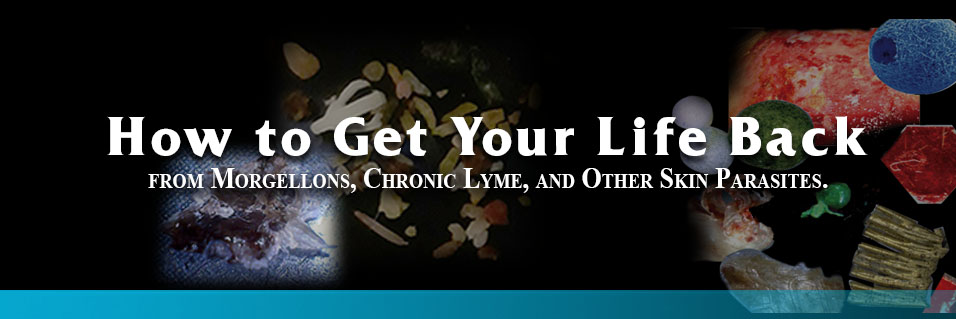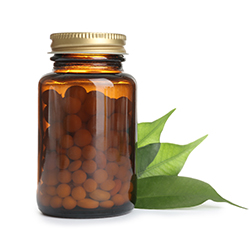This report about antibiotics started out as 2 paragraphs and ended up being a full scale two part report. Medically, Lyme disease is an enigma. Because its a bacterium you would expect that the specified antibiotic treatment with doxycycline would be all that's required. Unfortunately, Lyme isn't often caught early, but instead later after it's gone into joints, organs, and musculature. To further complicate matters, after 6 months or longer without improving it is chronic and continued use of antibiotics can become harmful.
This is echoed in my free report, "Lyme Disease Doesn't Have to Own You Anymore" and a press release referencing a Canadian study, Lyme disease: Prolonged courses of antibiotics can ‘lead to harmful health outcomes’, according to Canadian experts where its stated, "Prescribing prolonged courses of antibiotics for patients experiencing symptoms attributed to Lyme disease can lead to harmful health outcomes, by Canada’s infectious disease experts."
Morgellons Disease is linked to Lyme disease in that the Lyme organism is also found in 90% of Morgellons' sufferers. Of the few doctors that treat Morgellons Syndrome, they treated it as Lyme disease with antibiotics. And the results were mixed.
This whole mess with antibiotics started back in the 30's with the AMA politics. Dr. Rife was pioneering the use of frequencies to cure disease, and Penicillin was discovered during that same time. Through a political choice, the AMA went with penicillin as the magic pill and Rifing was dropped from consideration. It's like a flip of a coin or the whim of the head of the AMA has determined our future since then - sad indeed. With Rifing, you can have detox reactions. But with antibiotics, you can not only have detox reactions, but a whole host of other side effects including the destruction of your gut biome. Read this post in well.org, Antibiotics, Their Side Effects, and How to Avoid Them. From the article, you'll see that antibiotics are not a summer picnic and can cause many other health issues plus be instrumental in breeding super bugs. "The first long-term effect of one round of antibiotic use is the killing of epithelial cells. 'Epithelial cells” are the cells used to build our skin, and they’re also the building blocks for our gut. Epithelial cells are responsible for dictating what goes in and out of the body, and what shouldn’t be let in at all.'"
Holly Cow, Is this insult to injury? Here they are treating Morgellons Syndrome with antibiotics that can damage your skin. Isn't that really stupid when Morgellons is already doing a great job of destroying layers and layers of skin?
And, "Another issue that antibiotics can cause, even after just one use, is the damaging of mitochondria in the body. Mitochondria are a type of organelle found within each cell, and they’re responsible for energy production for the whole body."
Both these warnings are news to me and should be on the mind of every physician when prescribing antibiotics aka "killbioticsTM." Holy crap, the mitochondria are your life force. And, every responsible physician should be emphasizing the importance of boosting glutathione when prescribing antibiotics. This is where our MaxOne supplement shines. It's D-Ribose and L-Cysteine bonded together to get past the digestive system and into the cellular structure. Here's the magic: D-Ribose just happens to be the natural fuel of the mitochondria. So, if you must take antibiotics, the D-Ribose strengthens the mitochondria from being damaged by the antibiotics. And you can even get supplemental D-Ribose in powder form, but not sure how much gets past the stomach and into the cells But, we're not done yet. The L-cysteine combines with glycine and glutamic acid to produce glutathione. Glutathione has many functions. One is to modulate the mitochondria and another is to prevent free radical damage - oxidative stress - as reported in "Bactericidal Antibiotics Induce Mitochondrial Dysfunction and Oxidative Damage in Mammalian Cells." Why does it seem that of all the medical experts, (and I'm not a medical expert), none address the importance of glutathione. I mean, look at pubmed: 50,000 studies demonstrating the value of vitamin C and 80,000 studies demonstrating the value of glutathione in reducing oxidative stress, but few know of glutathione and everyone knows of the importance of vitamin C. In fact, glutathione recycles vitamin C so you don't really need to take more than 300 mg of Vitamin C which is included in MaxOne formulation.
The author of "Antibiotics, Their Side Effects, and How to Avoid Them." suggests countering the effects of antibiotics by taking probiotics with a specific ingredient - bacillus clausii. Unfortunately, for most of us, probiotics feed Spring Tails (Collembola), and are not part of the diet. Our approach goes one step beyond probiotics to use prebiotics. Here's a great recipe for the Best Stage I Salad containing prebiotic super foods.
Here are two must read blog posts:
Why Probiotics are Not the Answer to Morgellons and Prebiotics Are 4/19/2020
Onions are a Super Food 4/27/2021
So, if you take antibiotics off the table for dealing with both Morgellons aka Lyme disease or simply Lyme disease? What's other option is there? Answer: See Part II of this report coming out in the next day or so.
|



